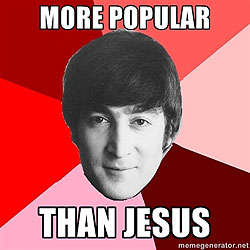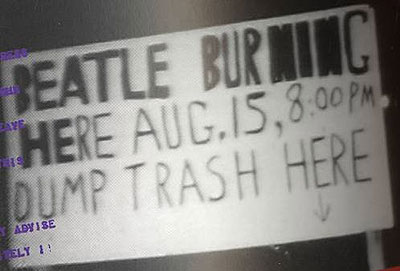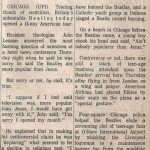The Beatles vs. Jesus
Published on January 30th, 2012 in: Issues, Media, Music, Oh No You Didn't |By Ayan Farah

It’s pretty hard to evade controversy when you’re in the most popular rock and roll band in the history of the world. Especially when you’re its most outspoken member. That band is, of course, The Beatles, and the aforementioned extrovert is none other than John Lennon.
Pegged “the smart one,” Lennon and band members Paul McCartney, George Harrison, and Ringo Starr achieved massive success throughout their eight-year partnership and emerged as musical innovators and arguably, the greatest influence on popular culture of the 1960s. In 1963, The Beatles achieved unprecedented popularity in their homeland, the UK, with a string of chart toppers that included “Please, Please Me,” “Twist and Shout,” and “She Loves You.” It wasn’t until the release of “I Want to Hold Your Hand” that they finally broke through to American audiences and by February 1964, following their landmark performance on the The Ed Sullivan Show, “Beatlemania” had officially taken over the world.
Upon arrival on US soil, those lovable lads from Liverpool instantly charmed American audiences with their witty sense of humor, their unusual accents, and perhaps inadvertently delivered a much needed diversion to a nation still reeling from the recent horrific assassination of its beloved President.
But it wasn’t long until The Beatles grew weary of the harsh glare of the limelight. Their exhausting tour schedules often kept them confined to hotel rooms to avoid the screaming hordes, the unbearable assault on their privacy, and to an extent, their sanity. Yet nothing seemed to compromise the band’s superb songwriting which in the span of less than two years exhibited a growing departure, both lyrically and stylistically, from the cute love songs that launched their careers.
By 1965, the band, but most notably John, explored themes of introspection and alienation in songs like “Help!,” “Nowhere Man,” and “In My Life” which resonated with youth living in a turbulent era marked by civil disobedience, a raging war in Southeast Asia, and a burgeoning counterculture that declined to uphold the social mores and values of the “Establishment.”
During their first US tour, The Beatles’ manager Brian Epstein prohibited the band from expressing their opinions of the Vietnam War so as to not upset tour promoters and potentially lose their financial backing. Epstein finally relented, at Lennon’s urging, which John explained during a 1966 press conference: “It seems a bit silly to be in America and for none of them to mention Vietnam as if nothing was happening . . . you can’t keep quiet about anything that’s going on in the world.” The band even had a provision in their contract, which stated that The Beatles would not perform for segregated audiences, resulting in either cancelled shows in some southern American cities or a temporary suspension of Jim Crow laws for the duration of the gig.
In March 1966, The Daily Standard featured an interview by journalist Maureen Cleave entitled “How Does a Beatle Live? John Lennon Lives Like This.” The article gave an intimate portrait of Lennon’s quiet suburban home life in Weybridge-Esher, a stark contrast to the hustle and bustle of swinging London. During the interview Cleave asked John about his views on religion, to which Lennon answered, “Christianity will go. It will vanish and shrink. I needn’t argue about that; I’m right and I will be proved right. We’re more popular than Jesus now . . . I don’t know which will go first—rock’n’roll or Christianity.”

The comment was barely noticed in England, but a few months later the article appeared in the August issue of Datebook, an American teen magazine, and the quote regarding Christianity made the front cover. The inevitable uproar caught on like wildfire, particularly in the Jim Crow Bible belt, leading to cancelled tour dates as well as death threats against the band. Radio stations organized Beatles boycotts and Beatles bonfires, urging teens to renounce those blasphemous heathens and burn whatever Beatles records and memorabilia they owned. Even the cross-burning Klan got involved, a likely ally in this holy war, as the terror organization perhaps felt inherently obligated to partake in any event involving fire, all in the name of the Great White Jesus that cured lepers, walked on water, fed the hungry, and preached the eradication of Blacks.
But threatening the wildly popular, Anti-Christ Beatles was certainly a worthy endeavor. In response to the furor, Brian Epstein immediately organized a press conference for the band, where John issued an apology and explained the context under which his comments were made: “Originally I pointed out that fact in reference to England. That we meant more to kids than Jesus did, or religion at that time. I wasn’t knocking it or putting it down. I was just saying it as a fact and it’s true more for England than here. I’m not saying that we’re better or greater, or comparing us with Jesus Christ as a person or God as a thing or whatever it is. I just said what I said and it was wrong. Or it was taken wrong. And now it’s all this.”
That explanation clearly wasn’t enough as the “Great Beatles Ban” raged on with full-force. The Memphis chapter of the KKK vowed to disrupt their August 19 performance at the Mid-South Coliseum, which called for heightened security at the venue as well as a carefully planned exit strategy for the band after the show. Luckily, they safely left Memphis but the event solidified the Beatles’ disinterest in touring and their final performance at San Francisco’s Candlestick Park on August 29 marked the end of the Beatles as a touring band.
Years later, John Lennon reflected on the incident, humorously expressing his gratitude to Jesus for putting an end to touring: “I always remember to thank Jesus for the end of my touring days; if I hadn’t said that The Beatles were ‘bigger than Jesus’ and upset the very Christian Ku Klux Klan, well, Lord, I might still be up there with all the other performing fleas! God bless America. Thank you, Jesus.”

Time limit is exhausted. Please reload the CAPTCHA.